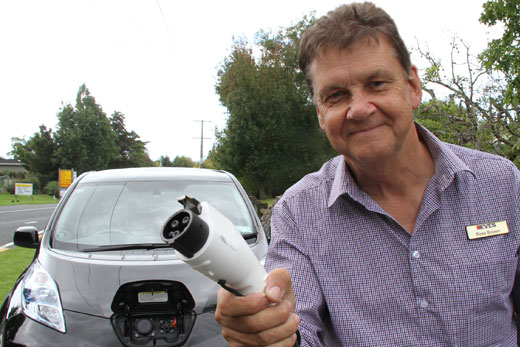New research out of the University of Otago indicates Kiwis are keen to make the shift to energy efficient electric vehicles (EVs) but some key barriers are holding them back.
Dr Rebecca Ford, of Otago's Centre for Sustainability, says that although EV uptake has been relatively slow - there were only 660 EVs in New Zealand as of May 2015 - they have an important role to play in New Zealand's transport future.
Ross Brown with his investment – a 100 per cent electric car.
"EVs are far more cost-effective to run than cars that use diesel or petrol. The challenge is in overcoming the obstacles preventing many New Zealanders from making the switch," says Dr Ford.
The Leaf is powered by an 80kW synchronous electric motor with a 24kW lithium-ion battery with 3.3kW on-board charger.
'It's got the power, grunt and oomph of any good car, and probably better than most,” says Ross.
Rebecca's study found the majority of Kiwis surveyed felt positively about driving an EV with most indicating they were willing or very willing to drive one in the future.
Additionally, 30 per cent would ‘likely' or ‘definitely' buy an EV if the purchase price was the same as a petrol or diesel car, and another 40 per cent would ‘consider' purchase under this scenario.
The price of EVs was the most important factor for people considering buying an EV, followed by vehicle range and charge time. The age of the vehicle was least important, suggesting New Zealanders may be happy to buy second-hand EVs.
Rebecca and her co-authors suggest several options which they say could help stimulate uptake:
- Charging stations - set up charging stations at regular intervals, with fast charging technologies, so drivers can be certain they will be able to get where they want to go.
- Fleet purchases - government and commercial fleets purchase EVs, allowing them to come on the market as second-hand vehicles in a few years' time.
- Educate consumers - improve consumers' knowledge about EVs, their environmental benefits, and their whole-of-life costs compared to petrol or diesel cars.
- Demonstrations - increase familiarity with EVs with on-road demonstrations, giving consumers an opportunity to gain first-hand experience.
- Retrofit - convert conventional cars to EVs through retrofitting.
- Manage at-home charging - ensure effective arrangements for at-home charging to mainly occur in off-peak periods, to avoid negative impacts on the electricity grid.
Rebecca says overall, things look positive for electric vehicles in New Zealand.
"There appears to be a strong latent appetite for electric vehicles, and the biggest barriers to uptake - cost, range and charge time - will be resolved as EVs continue to get cheaper and more advanced.
"The threat is that we get left behind the rest of the world because we take up EVs too slowly. And that would be a pity, as we have plenty of renewable electricity to power them, and Kiwis are keen."
The Keen on EVs: Kiwi perspectives on electric vehicles and opportunities to stimulate uptake report summarises the findings of four separate research projects undertaken as part of the University's GREEN Grid and Energy Cultures research projects. Funding for the projects was provided by the Ministry of Business Innovation and Employment.



2 comments
Electric cars
Posted on 02-07-2015 15:41 | By NZgirl
Are a good idea but electric cars in 2015 are like Atari PONG was in 1972. I'll wait till electric cars get like computer games in 2015 Call of Duty 3 etc.
Not there yet
Posted on 03-07-2015 21:09 | By Politically Incorrect
Electric cars just aren't there yet, kiwis like to travel and these things can barely go 80kms before needing an overnight charge. Even with regular charge points, having to wait so many hours to get another few kms is no go. If you have to also own a petrol or diesel car to go anywhere out of town, it's too cost prohibitive. EVs are fine in big cities, but impractical for most of New Zealand as of today's technology.
Leave a Comment
You must be logged in to make a comment.